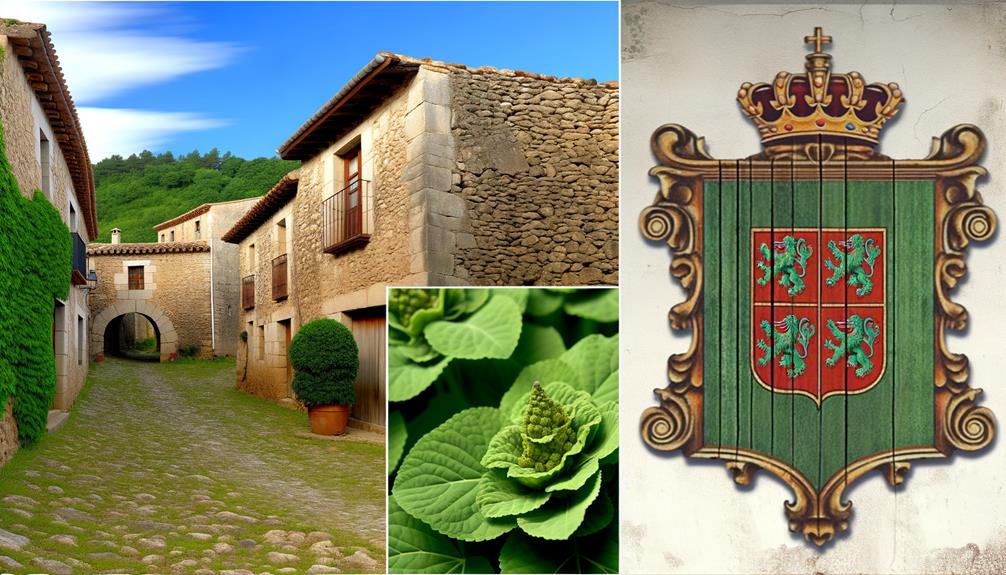Avila Name Origin and Meaning
The surname Avila originates from the medieval city of Ávila in Spain and is associated with noble lineages and military roles. It symbolizes resilience and strategic importance in Iberian history.
The name also carries cultural and spiritual significance due to its connection to Saint Teresa of Ávila and the region's theological heritage. Derived from a Spanish place name, Avila signifies 'desire for peace,' reflecting aspirations for tranquility and harmony.
It is prevalent in Spanish-speaking countries like Mexico, the United States, and Brazil. Variations include Ávila, Avilés, and Avilas.
To uncover more fascinating details, continue exploring.

Key Takeaways
- The surname Avila is derived from the ancient city of Ávila in Spain.
- It signifies 'desire for peace' or 'desired', reflecting tranquility and harmony.
- Historically linked to medieval military or administrative roles in Castile and León.
- Associated with spiritual depth, including ties to Saint Teresa of Ávila.
- Common in Spanish-speaking countries, with variations like de Avila or d'Avila.
Historical Roots of Avila
Rooted in the rich tapestry of Iberian history, the surname Avila traces its origins to the ancient city of Ávila in Spain's Castile and León region.
This surname is believed to have emerged during the medieval period, a time characterized by significant socio-political upheavals and reconsolidation of territories.
The city's strategic location and fortifications made it a notable stronghold during the Reconquista. Historical records suggest that families bearing the Avila name were often associated with military or administrative roles, reflecting the city's importance.
The surname itself encapsulates a legacy of resilience and fortitude, qualities that were essential for survival and prominence in medieval Spain.
The Avila name, hence, serves as a living testament to a storied past deeply intertwined with Iberian heritage.
Geographic Significance
How does the geographic significance of the city of Ávila contribute to the understanding of the Avila surname?
The city of Ávila, located in the autonomous community of Castile and León in Spain, is renowned for its well-preserved medieval fortifications. This historical prominence is pivotal in understanding the surname Avila, as it suggests a connection to a place of strategic military importance.
The name likely originated from inhabitants or defenders of the city, who adopted the name to signify their association with this notable location.
The geographical features, such as its elevated position and robust defensive walls, further underscore the city's role as a bastion, thereby offering insight into the sociopolitical context in which the Avila surname emerged.
Noble Lineages
The noble lineages associated with the Avila name possess historical roots that trace back to medieval Spain, highlighting the family's longstanding influence and prestige.
Detailed examination of prominent family branches reveals their significant roles in political, military, and cultural spheres throughout history.
This exploration underscores the enduring legacy and societal contributions of the Avila lineage.
Historical Roots Explored
Tracing the historical roots of the Avila name reveals its connections to noble lineages that have played significant roles in European history. Originating from Spain, the Avila family name is linked to the region of Castile and León, where it held considerable influence during the medieval period.
Historical records suggest that members of the Avila lineage were landowners and military leaders, contributing to the Reconquista efforts against Moorish rule. The prominence of the Avila family is further evidenced by their participation in the political and social spheres of the time, often serving as advisors and courtiers to the Castilian crown.
These contributions underscore the Avila name's enduring legacy within the noble echelons of European society.
Prominent Family Branches
In examining the prominent family branches of the Avila lineage, one finds a diverse array of noble houses that have each contributed uniquely to the historical tapestry of European aristocracy.
Notable among these is the House of Avila, which rose to prominence in medieval Spain, playing significant roles in the Reconquista and the establishment of Christian rule.
Another illustrious branch includes the Avilas of Portugal, who were instrumental in maritime explorations during the Age of Discovery.
Additionally, the Italian Avila families, though fewer in number, made substantial contributions to the cultural and political life of the Renaissance era.
Each branch, while distinct in its achievements, collectively underscores the enduring legacy of the Avila name in European history.
Spiritual Connections
Exploring the spiritual connections of the name Avila reveals significant ties to religious and mystical traditions. Particularly, Saint Teresa of Ávila, a prominent Spanish mystic and Carmelite nun, has profoundly influenced the spiritual landscape associated with the name. Her theological contributions and deep mystical experiences underscore Ávila as a beacon of spiritual depth and contemplation.
Additionally, the name is linked to the ancient city of Ávila in Spain, renowned for its historical religious significance, including its well-preserved medieval walls and numerous churches. These elements collectively imbue the name Avila with a rich tapestry of spiritual meaning, reflecting a heritage steeped in religious devotion and mystical exploration.
Therefore, the name resonates strongly within both historical and contemporary spiritual contexts.
Variations and Adaptations
The name Avila has undergone various transformations and adaptations across different languages and cultures, reflecting its widespread appeal and integration into diverse linguistic traditions.
In Spanish-speaking regions, Avila often retains its original form, yet in other European languages, such as Portuguese, it can appear as Ávila, with an accent mark denoting pronunciation differences. Additionally, in Italian contexts, it might be adapted to Avilla, aligning with phonetic norms.
The variations also extend to surnames, where it appears as de Avila or d'Avila, indicating lineage or geographic origins. This adaptability underscores the name's enduring resonance across cultural boundaries, highlighting its ability to maintain relevance while accommodating linguistic nuances.
Through these transformations, Avila continues to be embraced globally.
Modern-Day Relevance
The name Avila continues to hold considerable cultural significance, reflecting a rich historical heritage that resonates in contemporary society. Its popularity has seen a resurgence in various regions, particularly in Spanish-speaking countries and among communities that value ancestral connections.
This modern-day relevance underscores the enduring appeal of the name, as it bridges historical roots with present-day identity.
Cultural Significance Today
In contemporary society, the surname Avila holds significant cultural relevance as it symbolizes a rich heritage and serves as a marker of identity for individuals of Hispanic descent. It represents a connection to historical narratives and familial legacies, often traced back to specific regions in Spain.
The name Avila evokes a sense of pride and continuity, linking individuals to their ancestral roots and cultural traditions. Additionally, the surname’s prevalence in various professional and social spheres underscores its enduring influence, often seen in the arts, politics, and academia. Furthermore, the etymology of the name Avila holds significant cultural and historical significance. Originating from the Latin atticus meaning “belonging to the Attic region,” the name signifies a connection to ancient Greek civilization and philosophy. This meaning adds a layer of depth to the name Avila, highlighting the rich cultural tapestry from which it originates. Overall, the name Avila serves as a reminder of the enduring impact of cultural heritage and the interconnectedness of individuals across time and space. The atticus meaning of the name Avila provides a sense of belonging and identity for those who carry it, fostering a deep pride in their roots and a strong connection to their cultural heritage. This understanding of the name’s origin also contributes to a sense of unity and shared history among individuals who bear the name Avila, creating a community that transcends geographic boundaries and time periods. Ultimately, the atticus meaning of Avila resonates with individuals on a personal level, serving as a source of inspiration and a testament to the enduring legacy of ancient civilizations.
This sustained presence highlights the importance of the Avila name as a cultural and social identifier, fostering a sense of belonging and community among bearers of the name.
Popularity Across Regions
Analyzing the modern-day relevance of the surname Avila reveals its widespread popularity across various regions, reflecting migration patterns and the diaspora's influence on demographic distributions. The surname is prevalent in countries such as the United States, Mexico, Spain, Brazil, and Argentina. This distribution underscores the historical movement and settlement of individuals bearing the Avila name. The table below provides a snapshot of the surname's prevalence in these regions:
| Country | Prevalence Rank | Approx. Number of Individuals |
|---|---|---|
| United States | 500th | 80,000 |
| Mexico | 200th | 120,000 |
| Spain | 150th | 60,000 |
| Brazil | 300th | 50,000 |
| Argentina | 250th | 40,000 |
This data evidences the extensive reach and modern relevance of the Avila surname globally.
Conclusion
In examining the origin and meaning of the name Avila, what emerges is a rich tapestry woven from historical roots, geographic significance, noble lineages, and spiritual connections.
Variations and adaptations of the name highlight its enduring legacy. How does this multifaceted heritage continue to influence contemporary society?
By understanding Avila's past, a deeper appreciation for its modern-day relevance is gained, affirming its place in both historical and cultural contexts.






